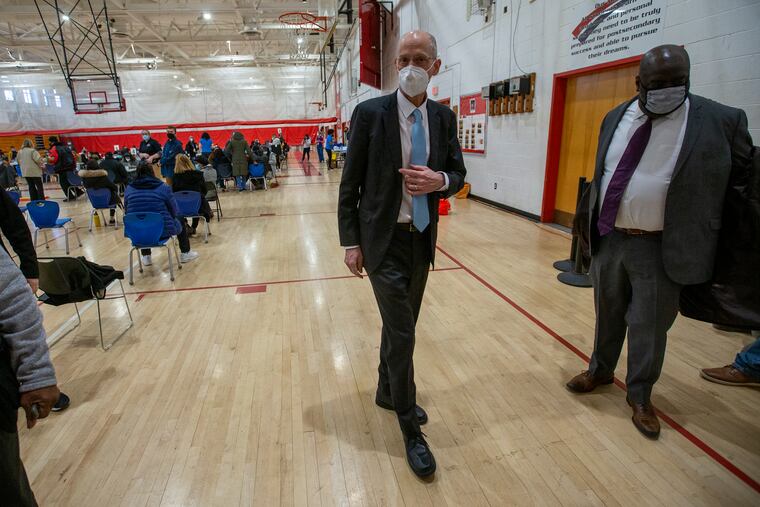Philly’s Health Department budget shows that COVID-19 is here to stay
The Health Department would continue to have a COVID containment division. And Mayor Kenney's administration wants to focus on racial disparities in health care, an issue highlighted by the pandemic.

Mayor Jim Kenney’s budget proposal for the next fiscal year is focused on gradually returning Philadelphia to normal. But the Health Department budget reflects the likelihood that COVID-19 is here to stay.
Kenney says keeping Philadelphians healthy is a top priority for the coming years, representing a shift toward prioritizing public health as a result of the pandemic. The department will also have a renewed focus on racial disparities in health care, amid a pandemic in which Black and brown residents were most likely to get severely ill or die of COVID-19.
The Health Department budget proposal of $162.5 million represents 3.1% of Kenney’s proposed $5.18 billion spending plan. Other city departments, including police, fire, and the pension system, account for much larger shares of city spending. But the Health Department budget contains targeted spending increases for specific programs related to the pandemic and other issues.
Philadelphia created a Division of COVID Containment within the Health Department in the past year. It now has 215 employees, according to city budget documents, who work on testing, contact tracing, isolation, quarantine spaces, epidemiology, and the city’s coronavirus call center.
If City Council adopts Kenney’s budget proposal, the department would receive $980,000 in new funding for the fiscal year starting in July, said city spokesperson Mike Dunn. That’s on top of the $75 million set aside in a reserve for ongoing costs of the pandemic — $50 million of which is specified for coronavirus containment — as well as federal funding going toward pandemic-related costs.
» READ MORE: Philly OKs indoor weddings and catered events, further easing coronavirus restrictions
The containment division was initially funded by federal grants and would also continue to receive some federal money.
Besides continuing the work it has already been doing to fight the pandemic, the division will add an outbreak management team as vaccinations increase and cases decrease, according to Kenney’s budget proposal. The outbreak unit will “provide support to partners and communities in containing outbreaks, including swift availability of testing and support for guidance on isolation and quarantine,” according to the city’s five-year plan.
The department also hopes to expand its immunizations unit and its emergency preparedness and response unit “so that it can better deliver COVID-19 vaccines and respond to future emergencies of all sorts,” Dunn said.
The health budget proposal also includes $250,000 to support the formation of a racial equity plan, addressing an issue that city officials say already existed but was highlighted by the pandemic.
The mayor’s five-year plan, for example, cited as a priority attacking the “unacceptably high rates at which Black and brown Philadelphians suffer from hypertension, diabetes, cancer, asthma, and maternal mortality.”
» READ MORE: Kenney sees ‘hope for an eventual return to all that makes Philadelphia great’ in annual address
Other new and additional costs in the Health Department budget proposal include $1 million to address air pollution and air quality — issues with a disproportionate impact on Black and brown neighborhoods.
Dunn acknowledged the Health Department’s limited ability to combat racial health disparities, but said the department would focus on making recommendations and prioritizing programs that could make an impact.
“The Health Department believes that racial disparities in health outcomes are mainly driven by social issues — specifically historic and current racism that lead to reduced income, employment, and other opportunities — which, over lifetimes, appear as health problems and decreased life expectancy,” Dunn said. “Closing the gap in health outcomes will require solving those larger social inequities, which are not under control of the Department of Public Health.”